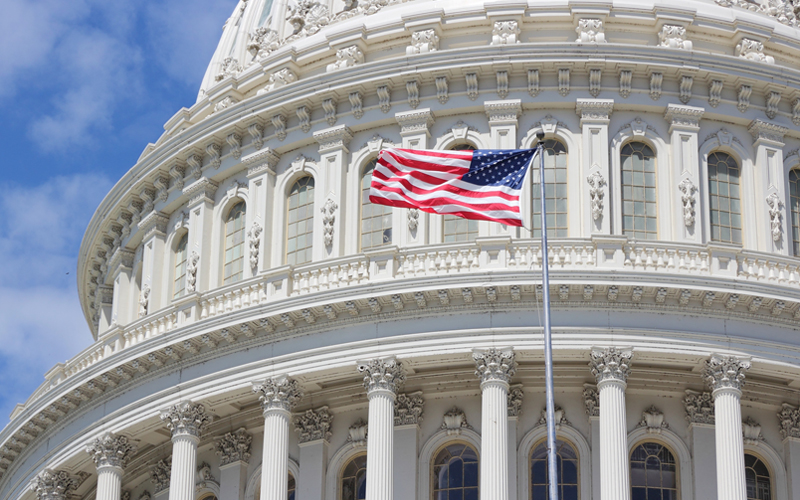Congress Pushes Back on Regulators and Legal Settlement Impact on Interchange
Posted by Ryan Fitzgerald on March 29, 2024

During the past few weeks, since the GoWest delegation returned from the ACU National GAC, we have seen some small wins and glimmers of activity that will help us build momentum against misguided legislation and regulatory overreach at the Federal level. Provided below are several examples of these activities, and we expect to see additional actions taken by Congress in the coming weeks and months to push back on these impactful measures. The GoWest team is continuing to take fervent steps to counter these acts, while also engaging our delegation to get involved in the efforts, where appropriate.
Congressional Review Act Introduced to Disapprove of CFPB Reg. Z Changes
On Tuesday, Rep. Andrew Ogles (R-TN-5) introduced H.J. Res. 121 that outlines Congress’s disapproval of the recently finalized Consumer Finance Protection Bureau (CFPB) rule relating to credit card late / penalty fees, known as Regulation Z. This Congressional tool, known as the Congressional Review Act (CRA), provides Congress with the ability to formally disapprove of administrative rules that have been put in place by the Executive Branch, which stops the rule from being implemented and forces the regulatory body or agency to start over in their effort to regulate the specific matter. A similar joint resolution was passed by Congress, at the end of last year, in an effort to overturn the CFPB’s Section 1071 business lending reporting requirements; however, President Biden vetoed that bi-partisan effort in Congress, and an override of the veto was unsuccessful. The GoWest advocacy team is advocating our delegation to provide support for this disapproval effort. We will push for similar Congressional actions if, and when, the CFPB finalizes its overdraft and other related rules later in 2024 and into 2025.
Luetkemeyer Formally Introduces “Stop & Study” Bill on Reg. II
As expected and discussed at the National GAC, Rep. Luetkemeyer has now formally introduced H.R. 7531. The Secure Payments Act of 2024, which would require the Federal Reserve Board to “Stop and Study” their proposed reductions to debit interchange to ensure the full impact of this proposal is understood for both consumers, merchants, and financial institutions. If passed, the legislation would require the Federal Reserve to complete a formal study and report to Congress on the state of the interchange system as well as the impacts the proposed changes would have on:
- Consumers, including access to free or low-cost deposit accounts;
- Merchants’ costs of accepting debit cards; and
- Financial institutions’ efforts to mitigate fraud.
In our follow-up messaging to Congressional offices, following credit unions’ recent meetings at the GAC, the GoWest team has urged all House offices to co-sponsor and support this legislation. We will continue our efforts to advocate directly to the Fed on the REG II issues, including with planned upcoming meetings with Federal Reserve Board Governors and staff, through comment letters, and Congressional outreach in response to the proposed rule.
VISA and Mastercard Reach Settlement with U.S. Merchants on Swipe Fees
On Tuesday, a landmark $30 billion settlement was announced between VISA, Mastercard and a large group of U.S. Merchants, following decades of litigation, which will provide reduced card fees for merchants over the next 5 years, while also providing greater technical benefits and negotiating power for participating merchants.
At this time, there is not a specific line of sight to impacts that the settlement will have on GoWest credit unions, but it does lend a significant amount of credence to allowing the market, current law, and the court system to provide solutions where they are believed to be needed. Government price controls and network restrictions would only hurt financial institutions and consumers, while also hindering the future development and innovation in the payments ecosystem.
Richard Hunt, Executive Director of the Electronic Payments Coalition, said in a statement “Congress should put an end to the ill-advised Durbin-Marshall mandates and let the agreement merchants reached stand on its own”, while specifically referring to the Credit Card Competition Act (CCCA) sponsored by Senators Dick Durbin (D-IL) and Roger Marshall (R-KS).
Congressional leaders including House Financial Services Committee Chairman Patrick McHenry (R-NC) and Senate Banking and Finance Committees member Thom Tillis (R-NC) reiterated similar opinions stating, “there is no reason for Congress to intervene with ill-advised legislation like the Credit Card Competition Act.”
As previously shared, Senator Durbin announced plans to hold a hearing in the Judiciary Committee, in early April, to discuss the Interchange issue. In late February the Senator sent formal requests to have the CEOs of Visa, Mastercard, United and American Airlines testify before the committee on credit card swipe fees and interchange; however, all four business leaders have declined the Senator’s request to testify. Durbin indicated in an interview last Friday, that he did not plan to subpoena the Executives, so it appears the plans for an Interchange hearing remain on pause for at least the near term.
More importantly, Senators Durbin and Marshall have reinstituted their effort to attach the CCCA onto any legislation moving forward in the 118th Congress. Most recently, they filed an amendment to add the bill to the remaining appropriations for FY2024, which passed Congress late last Friday, avoiding a government shutdown. Due to the advocacy efforts of GoWest and member credit unions, several members of Congress, including members of our delegation, placed a “hold” on this specific amendment, which makes it extremely difficult for Durbin and Marshall to attach the CCCA to any other measure without requesting a number of procedural votes. The collective efforts of credit union and financial services advocates have been successful in not allowing a repeat of how the original Durbin amendment was passed, as a last minute, middle of the night attachment to the Dodd-Frank Act.
GoWest will continue our dedicated and intense advocacy on this and all of the aforementioned issues as we know the impacts these misguided policies will have on credit unions in our region. Please continue to share your stories and the data that you have regarding these impacts, as we continue to review every avenue where our collective advocacy can make an impact with Congress, regulators and the Administration.
Posted in Advocacy on the Move, Federal Advocacy.


















